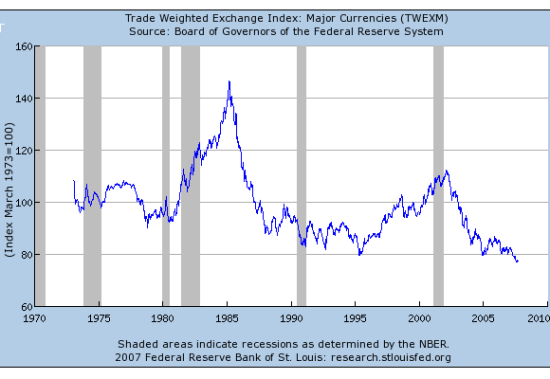

|
| weblog/wEssays archives | home | |
|
Trade Imbalances and the Dollar (September 13, 2007) Fed Chairman Ben Bernanke came out and stated the obvious in a speech delivered in Europe: there is a global trade imbalance between the U.S. and everyone else which has to be fixed. You know the saying: a trillion here and a trillion there, and pretty soon you're talking real money. With a trade deficit of around $750-$800 billion a year, the U.S. has been shoveling dollars abroad in exchange for goods at a prodigious rate. As foreign holders of these dollars have tried to find a home for their ever-growing mountain of bucks, they've thrown dollars into U.S. Treasuries and other U.S. debt. For their investment in America, they've received a 30% haircut in value as the dollar has depreciated. Now the political war drums are beating for some quick and dirty fix of the imbalance. Everyone's favorite fix at the moment is a re-valuation of the Chinese yuan, a bit of wizardry of such unlimited powers that even Gandalf would be envious. But before we jump into that morass, let's look at a chart of actual facts, courtesy of U.S. Census Bureau and the CIA Factbook, two eminently reliable sources: 
And of course you know who the bad guys are here, the ones running huge deficits with the U.S. Yes, the villains are: 
Japan and Germany. Funny, but no one ever complains about their staggeringly large trade deficits with the U.S.. You have noted, of course, that the stats are "per capita," which skews the data from nominal dollars to populations of the trading nations. I did this to reveal yet again how "factual statistics" can be presented to support various biases/political positions. According to this chart, we should be screaming for a rise in the yen and the euro, and demanding Japan and Germany buy more American products to offset their deficits. Here are the statistics (U.S. Census Bureau:) In millions: (imports from U.S., exports to U.S.) Imports: Exports: Deficit 59,612.7 148,180.8 -88,568.1 Japan 2006 41,319.1 89,082.0 -47,763.0 Germany 2006 55,185.7 287,774.4 -232,588.6 China 2006 Population: (CIA Factbook) 127,433,494 Japan 82,400,996 Germany 1,321,851,888 China As I have noted here many times, trade has always been a primary source of national wealth. And as I have also noted many times, the huge profits in this trade aren't being reaped by the Chinese, but by American companies: Trade War with China: Who Benefits? (April 11, 2007) Why China Is Being Scapegoated (May 21, 2007) The Paradox of Plenty: Manufacturing (May 2, 2007) As for trade having been the source of wealth since ancient times, I recommend the fun-to-read three-volume history classic by Fernand Braudel, The Structures of Everyday Life (Volume 1) Could Mr. Bernanke be planning another, less ballyhooed fix of the trade imbalance? Longtime contributor Dorothy S. suggests this could be the case: As you well know Bernanke's speech today was about balancing the trade deficit globally (of course what he really means is the US.) His speech was devoid of any mention of interest rates however, he did give us a clue.So the solution to the trade deficit is the willful destruction of the dollar via Fed rate cuts. (Or as Dorothy suggests, at least that's the fig-leaf being offered to justify rate cuts). Lest you think there is no connection between rate cuts and the dollar, then please read this article recommended by longtime contributor J.F.B., who noted that rate cuts in 1987 sent the dollar over a cliff: A Falling Dollar, After All New correspondent Mark A. recommended this longterm chart of the dollar (in relation to major currencies) from the St. Louis Fed site: Dollar Trade Weighted Exchange Index: Major Currencies 
Alternatively, if Mr. Bernanke and Company decide that the dollar collapsing would be even worse than letting Wall Street speculators go belly-up, then they will have to hold the line on interest rates, regardless of the domestic chorus begging for rate cuts. The operant phrase is here is "on the horns of a dilemma." Anyone who thinks the domestic economy won't pay a price for a plummeting dollar is deluded. Anyone who thinks our trading partners will be delighted to see their trillions in Treasuries and other debt instruments evaporating before their eyes (the net result of a dropping dollar) and the sudden appreciation of their currencies against the dollar is truly deluded. If the Fed doesn't support the dollar, the gates of a peculiar and frighteningly unpredictable Hell will yawn open to swallow the U.S. On the other hand, cutting rates won't save the doomed speculators or the doomed homeowners who are essentially insolvent. So who in their right mind would cut rates, when it can only undermine the dollar and do nothing to save the bubble-blowers who are heading for bankruptcy? Who, indeed. We shall see who next week. Will an insignificant quarter-point drop surprise anyone? No. Will it fix anything? No. Thank you, George T., ($10) for your much-appreciated support to this humble site. I am greatly honored by your support and readership. All contributors are listed below in acknowledgement of my gratitude. For more on this subject and a wide array of other topics, please visit my weblog. copyright © 2007 Charles Hugh Smith. All rights reserved in all media. I would be honored if you linked this wEssay to your site, or printed a copy for your own use. |
||
| weblog/wEssays | home |